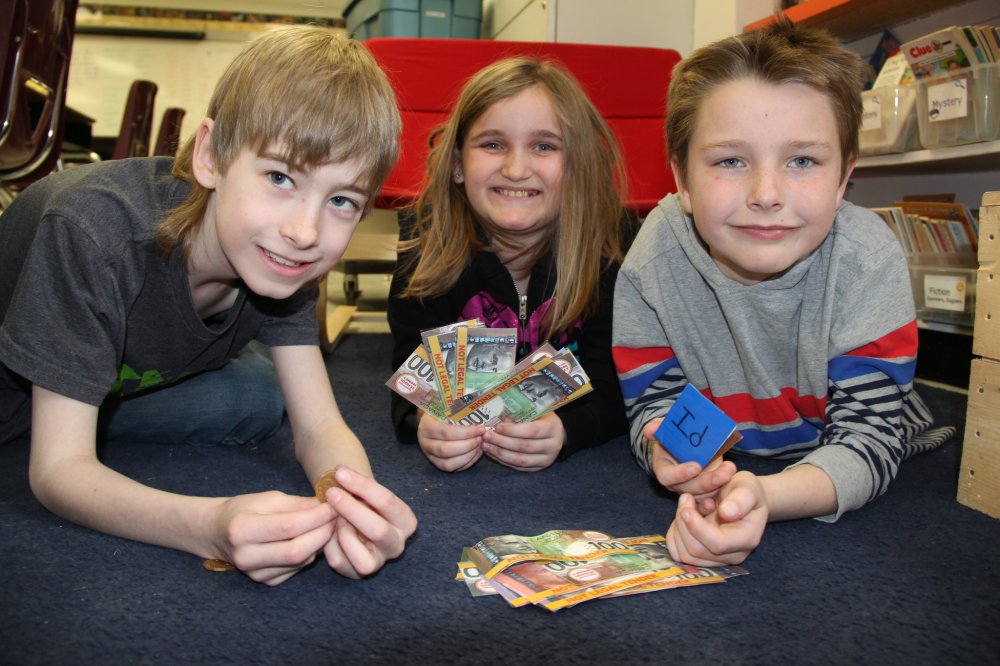A real world education
Students learn through simulation
Advertisement
Hey there, time traveller!
This article was published 31/03/2015 (3824 days ago), so information in it may no longer be current.
These children are no older than 11 years old and they already have a boss and a landlord.
They also know exactly who their tax man is, their elected representative and their chief justice.
Turns out, it’s all the same person.

“I’m everything. I’m a benevolent dictator,” laughed Chris Schroeder, who is also, on top of everything else, a Grade 4-5 teacher at Bothwell School.
Schroeder has established what’s called a classroom economy, after discovering this program developed by one of the world’s largest investment companies.
No better way to learn about numbers and fractions, Schroeder has discovered, than by giving students a real-world simulation in the way their parents deal with those same numbers themselves, by using money.
Each student has a job in the classroom, which pays a few hundred dollars biweekly in pretend money, of course. Positions range from bankers to custodians and a hot lunch master.
With money comes responsibility. The students must pay taxes, insurance and rent for their house—or desk, in this case.
Good behaviour such as scoring well on tests or being complimented by another teacher is worthy of a bonus.
There are fines, too. A police raid happens occasionally and if caught with a messy desk, you will be hit with a ticket. Littering or speeding, which is running down the hallway, may draw a fine, so will the worst crime of all in this jurisdiction, dishonesty.
It all culminates with an auction every month. Students only participate if they’ve paid their utilities, rent or any fines. Then, they can bid on prizes, like baked goods or couch time during movie showings.
By using the practical example of money management, the more than 20 students in this New Bothwell classroom are learning these valuable concepts in a fashion that will come in handy, for real, a decade from now.
“It reaches into the curriculum without being invasive,” said Schroeder.
“I can make it increasingly more lifelike as the year progresses and as kids learn how to do math, how to calculate percent, fractions, how to subtract and how to juggle bigger numbers in their head.”
The classroom economy develops more than a student’s math skills.
Students can ask for raises. Here they bolster their writing skills by penning a persuasive letter providing three reasons why they deserve a raise, and how much.
The social studies curriculum is touched on since the economy emphasizes being a good citizen. Helpfulness and being truthful goes a long way.
This is not a demanding time crunch on the school day, said Schroeder, but it’s something he can work on with students throughout the year.
He said the kids buy into the concept—as soon as they see the money.
“At this age kids are very keen to take responsibility on. I give a job to three kids to go and do and yes they’ll go and do it,” he said. “They want to please the teacher, they want to show that they’re responsible.”
Parents have been overwhelmingly supportive. They’ve been appreciative that their kids are learning about money management or take the initiative to study at home so they could earn better grades and thus more cash.
“They know that mom and dad pay taxes, they know that mom and dad pay insurance now, they know what’s that like, they can empathize,” said Schroeder.
Most of all, the kids seem to be enjoying themselves.
“I just like everything about it,” said nine-year-old Rayne Epp.
Connor Banman, also in Grade 4, is the richest student in the class. He has more than $5,000 in the bank.
“At the beginning of the year, I thought I would be sitting on the floor (without a desk), I had no idea how to make money,” said Banman of his job, which wasn’t well-paying. He made up for it, though, by reading lots: 25 cents per minute.
One of the best money-making schemes is building a real estate empire, which is what Banman has done. He is raking in the rent money by owning five and a half desks.
Then there’s Luke Toews, a police officer, who bought his desk and owns 34 percent of a classmate’s.
He has grand aspirations for his next big-ticket purchase, but he’s about $9,000 shy.
“I’m going to try and buy a desk but I’m also going to try and purchase Mr. Schroeder’s desk, which is $10,000.”
Epp pays her rent to Banman, but she’s already ahead on her payments, with March and April already taken care of.
“I’m the clerk, and I usually make $360 every two weeks but now I have two jobs,” she said of her new short-term helper gig.
The classroom economy, now in its second year in Schroeder’s class, is a fun way to teach students about financial responsibility, he said.
What pleases him is when these concepts expand beyond his domain. He sometimes suggests that students talk to their parents about taxes.
“Next day, I asked if they talked to their mom and dad. They say, ‘yeah, my dad just groaned or my mom and dad laughed,’ or there was a conversation that happened,” said Schroeder. “That’s been really fun to see, that this is coming back to mom and dad in a positive way.”
This story originally appeared in the Mar. 26 edition of The Carillon.
